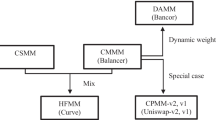Abstract
The Smart grid concept has lately attracted attention because of the increase in decentralized electricity generators and the development of the information communication technology. In the Smart grid concept, mutual information exchange among suppliers and consumers can be achieved to balance and optimize the supply and demand of electricity, which is generally necessary for a grid system. Taking this background into consideration, the necessity for electricity trade by which small-scale consumers such as households buy and sell electricity is now advocated to realize further stability of the grid system. However, it is noteworthy that consumers are self-interested, which endangers the grid system stability. This study proposes new trading mechanisms applied in the electricity trade and evaluates them in terms of stability and social surplus in the market. We examine their validity using experiments with human subjects and multi-agent simulations.













Similar content being viewed by others
References
Gross R, Leach M, Bauen A (2003) Progress in renewable energy. Environ Int 1(3):105–122
Abe R, Taoka H, McQuilkin D (2011) Digital grid: communicative electrical grids of the future. IEEE Trans Smart Grids 2(2):399–410
Rudkevich A, Duckworth M, Rosen R (1998) Modeling electricity pricing in a deregulated generation industry: the potential for oligopoly pricing in a poolco. Energy J 19(3):19–48
Tanaka M (2007) Oligopolistic competition in the Japanese wholesale electricity market: a linear complementarity approach. In: RIETI discussion paper series 07-E-023, pp 1–32
Vytelingum P, Ramchurn SD, Voice TD, Rogers A, Jennings NR (2010) Trading agents for the smart electricity grid. In: Proceedings of the ninth international conference on autonomous agents and multiagent systems, pp 897–904
Smith VL (1976) Experimental economics-induced value theory. Am Econ Rev 66(2):274–279
Smith VL (1982) Microeconomic systems as an experimental science. Am Econ Rev 72(5):923–955
Makris S, Zoupas P, Chryssolouris G (2011) Supply chain control logic for enabling adaptability under uncertainty. Int J Prod Res 49(1):121–137
Author information
Authors and Affiliations
Corresponding author
Rights and permissions
About this article
Cite this article
Hosokawa, S., Nishino, N. New mechanisms in decentralized electricity trading to stabilize the grid system: a study with human subject experiments and multi-agent simulation. Logist. Res. 5, 123–131 (2012). https://doi.org/10.1007/s12159-012-0092-y
Received:
Accepted:
Published:
Issue Date:
DOI: https://doi.org/10.1007/s12159-012-0092-y




